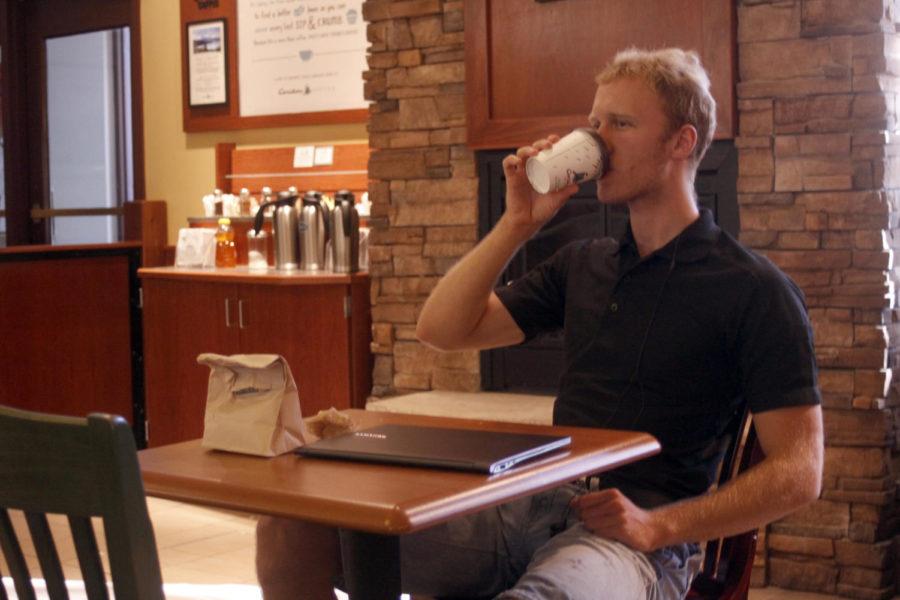Daily: Mindful living boosts creativity, focus
September 27, 2013
Meditation is often associated with hours of sitting cross-legged on the floor, lighting candles or activities like yoga. And while these are beneficial and worthwhile, the day simply doesn’t have enough hours to accommodate these practices. Mindfulness meditation, however, can be practiced anywhere and at anytime.
Mindfulness meditation emphasizes the same inner quietness and focus that yoga and other forms of meditation do, but instead of practicing meditation separate from the daily routine, mindfulness simply changes daily habits into moments of meditation.
Kate Bratskeir, of the Huffington Post, discusses this practice in her article “How to Meditate Without Meditating At All.” She says: “Your meditation doesn’t have to emulate the Buddha’s 49-day retreat. Whether you think there’s no time for a mindfulness meditation practice, or the concept of sitting in stillness is more daunting than restful, there are still ways to reap the benefits of the ancient art. … You don’t have to change your routine all that much: All it takes is tweaking your intention.”
Being intentional is what mindfulness meditation is all about. This might sound cliche, but it involves being aware of yourself moment-to-moment and in your daily activities. Bratskeir notes psychologists suggest simple practices such as turning off music while you walk or drive and concentrating on your sensory perceptions actually sharpens your inner focus and benefits mental and emotional health. Being mindful allows people to focus on their emotions and body, which can lead to better balance and more happiness.
She notes: “Many successful people (like Oprah, Rupert Murdoch and even Arianna Huffington, to name a few) credit meditation for their razor-sharp focus, enviable level of productivity and bountiful amounts of creative juice. You, too, can join this esteemed group of meditators without sitting cross-legged by candlelight. Here are a few ways to implement mindfulness into your everyday life.”
Bratskeir suggests several activities to begin practicing mindfulness meditation. For example, mindful cleaning. This might sound trite or undesirable, but focusing on cleaning stops your mind from simply wandering — as it is prone to do — and allows you to focus on a single thought or feeling. Many people who practice this suggest mindful dishwashing — the water and cleansing process is considered soothing and purposeful.
In addition to that, taking a warm shower and concentrating on the sensation and smells, of soap and shampoo, can help the body unwind and the mind focus. Other ideas include going for a run without your iPod, taking a walk and stargazing. What you do is not nearly as important as how you do it.
Intentional eating is another great way to experience mindfulness. Taking time to prepare a meal and focus on what goes into it can give one a sense of accomplishment and gratitude for what they are eating. Taking small bites, savoring and sitting down with others to share the meal can be a very rewarding experience. Even if your only option is grabbing something on campus or eating in the cafeteria, don’t rush through your next meal, take time to slow down and enjoy it.
Sipping your morning coffee is another great way to slow down and take time to focus. Often, we grab coffee on the go to get our caffeine boost for the day, but mindfulness meditation offers the opportunity both to savor the coffee and to increase productivity and focus by slowing down.
Writing or journaling is another great way to be intentional about your actions and interactions with the world around you. This space is wonderful for reflection, gaining perspective and being consciously thankful. Last year, I wrote about some of these benefits in the article “Unlocking creativity and happiness with journaling.”
Whatever it is that you do, slow down and take time to focus on the activity at hand. Become conscious of the moment you are living in and simply breathe in and out. Mindfulness meditation offers tangible rewards — increased productivity and creativity, but also leads to more abstract — mental and emotional rewards as well. Our hurried lives often push us through the motions too quickly to notice, leaving no time for relaxation or mindfulness. Be intentional to become balanced.

















